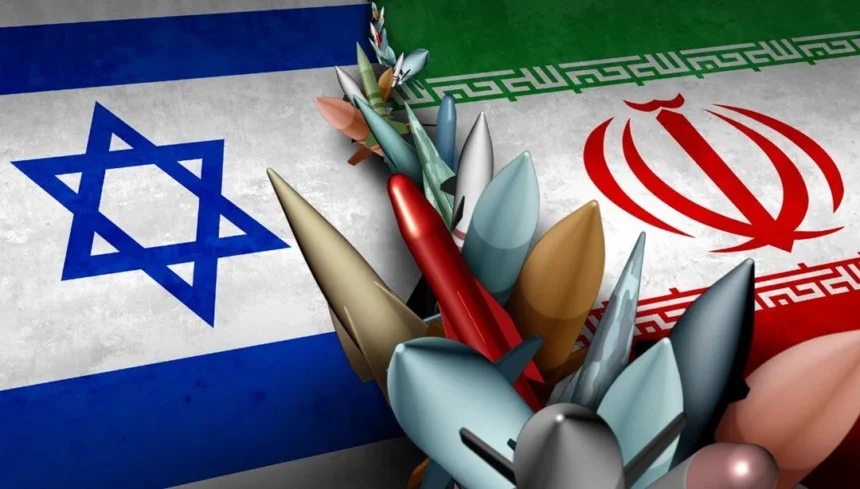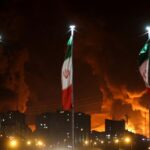Islamabad, Pakistan – In January 2024, Pakistan and Iran fired missiles to the territory of the other in a military escalation letter among the neighbors.
However, 17 months later, after Israel attacked Iran with attacks in the nuclear facilities of the liter, and murdered multiple Iranian generals and nuclear scientists, Pakistan quickly condemned Israeli action.
Islamabad described the Israeli strikes as violations of the territorial sovereignty of Iran and the theme labeled “shameless provocations”.
“The international community and the United Nations have the responsibility of defending international law, stopping this aggression immediately and holding the aggressor for their actions,” said Pakistan’s Ministry of Foreign Affairs in a statement on June 13.
As Israeli attacks against Iran, and Tehran retaliation attacks enter their sixth day, the deepest conflict is causing fears in Islamabad, they say analysts, rooted in their complex ties with Tehran and the even greater restlessness before the perspective of the aerial influence of the Israeli military that extend near the border of the Parkist.
The human cost of the Israel-Iran conflict in the energetic is growing. Irael’s attacks have already led to more than 220 deaths, with more than a thousand people injured. In retaliation, Iran has launched hundreds of missiles into the Israeli territory, resulting in more than 20 deaths and damage to extensive property.
While Pakistan, who shares a 905 km border (562 miles) with Iran through his southwest province of Baluchistan, has expressed firm support for Tehran, has also closed five border crossings in Baluchistan as of June 15.
More than 500 Pakistani citizens, mainly pilgrims and students, have returned from Iran in recent days.
“On Monday, we had 45 students who were looking for in several Iranian institutions returned to Pakistan. Almost 500 pilgrims also returned through Taftan’s border crossing,” said Taftan’s assistant commissioner, Naem Ahmed, Al Jazeera.
Taftan is a neighboring border city Iran, located in the district of Chaghi in Baluchistan, which is famous for its hills where Pakistan performed its nuclear tests in 1998, as well as for the known deposits of the Reko Diq and Saindak mines.
In the heart of the decision to try to seal the border is Pakistan’s concern for security in Baluchistan, which, in turn, is influenced by their ties with Iran, experts say.
A complex story
Pakistan and Iran have accused or have housed armed groups responsible for cross -border attacks against their territories.
The most recent outbreak occurred in January 2024, when Iran launched missile attacks to the province of Baluchistan of Pakistan, claiming to aim the separatist group Jaish Al-Adl.
Pakistan retaliates in 24 hours, hitting what they said were hide and separatists of Baloch within the Iranian territory.
The neighbors recovered after the escalation of that letter and the letter of the letter of Pakistan military conflict with India in May, Iran of the sides that deal with the study.
On Monday, the Minister of Foreign Affairs, Ishaq Dar, went to Parliament, emphasizing how Pakistan had been talking to Iran and suggesting that Islamabad was willing to play a diplomatic role to help negotiate the end of military hostilities between.
“Iran’s Foreign Minister [Abbas Araghchi] He told me that if Israel does not carry out another attack, they are prepared to return to the negotiating table, “Dar said.” We have transmitted this message to another country, which there is still time to stop Israel. “
The Minister of State of the Interior, Talal Chaudhry, told Al Jazeera that other nations needed to do more to press for a fire.
“We believe we are playing our role, but the world must also fulfill its duty. Syria, Libya, Iraq – the wars devastated them. It has taken to the emergence of Isis [ISIL]. We hope this is not repeated, “he added.
Fahd Humayun, assistant professor of Political Science at the University of Tufts and a visiting research academic at Stanford, said that any Pakistani bet on diplomatic impulse for peace would be helped by the fact that the president’s administration in United Trump, Argay in United Trump. Negotiations instead of war.
But Uumer Karim, a Middle East researcher at the University of Birmingham, suggested that despite all public rhetoric, Pakistan would be cautious about listing too much in the conflict at a time when he is trying to claim everything.
“I doubt that Pakistan has the ability or will to mediate in this conflict, but it definitely depends on relaxing as soon as possible,” he said.

Baluchistan and Safety Conerns
Pakistan’s biggest concern, the agreement for observers, is the possible consequence in Baluchistan, a province rich in resources but disturbing. Rich in oil, gas, coal, gold and copper, Baluchistan is the largest province in Pakistan per area but smaller per population, home of approximately 15 million people.
Since 1947, Baluchistan has experienced at least five movements of rebellion, the last beginning in the early 2000s. The rebel groups have demanded a majority of local resources or absolute independence, which caused decades or military repressions.
The province also organizes the strategic port of Gwadar, central to the China Economic Corridor of $ 62 billion (CPEC), which joins western China with the Arabic sea.
Baloch’s nationalists accuse the state of exploiting resources while neglecting local development, increasing secessionist and separatist feelings. Baloch’s secessionist groups on both sides of the border, partly the Baluchistan Liberation Army (Bla) and the Baluchistan Liberation Front (Bla), have been moving a rebellion in Pakistan to seek independence.
“There is a great concern within Pakistan that in the event that the war intensifies, members of armed groups such as Bla and BLF, many of which live in Iran’s border areas, could try to seek protection within Badeo Coundar,” he told Al Jazeera, a research fellow at the S Rajaratnam of International Studies in Singapore.
“Therefore, Pakistan had to close the crossing in an attempt to control the influx. It remains to be so, that they can do it successfully, but at least this is their goal.”
He worries about an Afghanistan Redux
Since the Soviet invasion of Afghanistan in 1979, the waves of Afghan refugees have sought refuge in Pakistan. The last mass entry occurred after the Taliban took care of Kabul in August 2021. At its peak, there were about 4 million Afghans living in the country.
In 2023, however, Pakistan launched a campaign to send refugees back to Afghanistan. According to government estimates, about one million of them have been expelled so far. Pakistan has cited incidents of armed violence in the country, which blames the groups that say shelter in Afghanistan, as a key justification for their decision. Taliban rejects the suggestion that allow the sanctuary of armed anti-pakistan groups in the Afghan territory.
Basit said that Pakistan would probably would like to avoid any repetition of what happened with Afghan refugees.
“With such a long edge [with Iran]And a history or a deep connection between the people on both sides, it is not because it was this factor that was considered in Pakistan’s decision to close the border, “he added.
Fears of Israeli aerial superiority
Baloch’s armed groups and the perspective of an influx of refugees are not the only concerns that probably concern Pakistan, experts say.
Israeli Prime Minister Benjamin Netanyahu has affirmed that his Air Force has control over the skies of Tehran. And although both Israel and Iran continue to hit the territory of others, Pakistan, which does not collect Israel and considers him a jury enemy, he will not do it because Israeli influence on Iranian airspace to grow and crawl to the border of Iran-Pakistan.
“Pakistan is also avers to Israel by achieving a complete aerial superiority and control or an Iranian airspace, since it would be the current security status Quo on the western flank of Pakistan,” said Karim, scholar of the University of Birmingham, Al Jazeera.
Break of the past
Ihsanullah Tipu Mehsud security analyst, based in Islamabad, said Pakistan has historically been on the side of the United States in regional wars, even in Afghanistan, but can doubt this time.
The majority of the Sunni nation, Pakistan still has an important Shiite population, more than 15 percent of its population of 250 million.
“Pakistan already has dalt with sectarian problems and openly supporting military action against [Shia-majority] Iran could cause a great setback, “he said.









